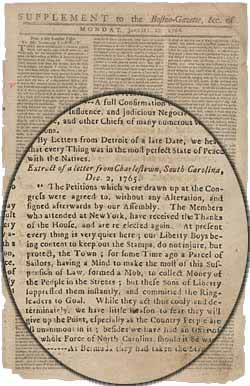Collections Online
"Extract of a letter from Charlestown, South Carolina, Dec. 2, 1765 ..."
To order an image, navigate to the full
display and click "request this image"
on the blue toolbar.
-
Choose an alternate description of this item written for these projects:
- Main description
[ This description is from the project: Coming of the American Revolution ]
This newspaper article excerpts a letter written from Charleston describing the power and influence of the Sons of Liberty group there. When "a Parcel of Sailors, having a Mind to make the most of this Suspension of Law, formed a Mob, to collect Money..." the Charlestown "Liberty Boys" kept the peace.
Keeping the Peace
The Sons of Liberty groups that organize in 1765 have a specific mission: to act on behalf of the community in matters pertaining to the Stamp Act. As colonial leaders buckle under pressure from Stamp Act protestors, the Sons aim to uphold--not overturn--established government. The Sons quickly discover that the violence that plagued early Stamp Act protests (such as those in Boston) only served to drive supporters away. Meanwhile, less scrupulous individuals attempt to use the name "Sons of Liberty" to legitimize their illicit activities within the eyes of the community. As a result, the Sons of Liberty begin referring to themselves as the "true" or "true-born" Sons of Liberty to distinguish themselves from the opportunists. In Charlestown, South Carolina, as in many colonies, the Sons of Liberty--here known as Liberty Boys--do their best to keep the peace.
To examine both pages of this newspaper supplement, please see the online display of Supplement to the Boston-Gazette, 27 January 1766.
Questions to Consider
1. What are the main functions of the "Liberty Boys?"
2. What offense do the sailors commit? How do the Liberty Boys respond?
3. What have they done with the stamps in Bermuda?
4. What is the "Congress" referred to in the opening sentences of the article?
5. Why might the Sons of Liberty make a deliberate attempt to uphold legal government? How does this decision relate to their understanding of the legalities of the Stamp Act?
Further Exploration
6. QUESTION

